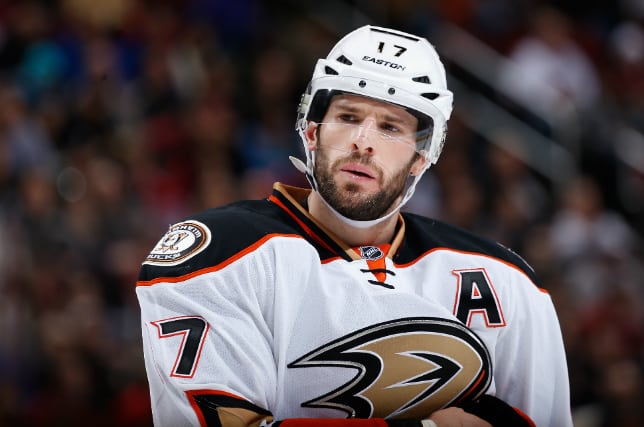
The many pitfalls of Ryan Kesler's six-year, $41.25-million extension
Ryan Kesler will earn almost $7 million a year on an extension that pays him into his late 30s. Will he live up to that contract, or will his body break down first?
 The many pitfalls of Ryan Kesler's six-year, $41.25-million extension
The many pitfalls of Ryan Kesler's six-year, $41.25-million extensionThe Ryan Kesler trade was a coup for the Anaheim Ducks.
The Ryan Kesler extension, however? Hm.
Kesler, 31 this August, was precisely what Anaheim hoped he'd be in his first season with the team. He was a capable second-line center behind star Ryan Getzlaf. Kesler played close to 20 minutes a game. He killed penalties. He scored shorthanded goals. He saw some power play time. He provided secondary offense with 20 goals and 47 points while playing a shutdown role and finishing 10th in Selke Trophy voting. Gone were his days as a 41-goal scorer, but that wasn't what Ducks GM Bob Murray acquired Kesler for. Kesler did just what he was supposed to, especially in the post-season, when he was a genuine terror, amassing seven goals and 13 points in 16 games and coming up big in clutch moments time and again.
So Kesler established himself as a crucial part of the Ducks' Stanley Cup puzzle, and he had another year left on his contract to help with the championship push. The Ducks have added Carl Hagelin, Kevin Bieksa and Chris Stewart, too, while saying goodbye to Emerson Etem, Kyle Palmieri and James Wisniewski. They have a nice blend of youth, superstars and veterans, which is why certain pundits like them to go all the way in 2015-16.
But Kesler's contract extension, announced Wednesday, bulges the eyeballs out of one's head. Six years and $41.25 million, good for an average annual value of $6.875 million. Whoa.
Where to start with this? On the surface level, even if Kesler had signed a one-year pact at this value, it's a lot of money for a second-line pivot. No unrestricted free agent signed for more than $6 million this off-season, and Kesler will start earning $6.875 million in 2016-17 after turning 32.
Factor in the term – six years – and this deal is even tougher to fathom. Any NHLer would have a tough time delivering on that deal through his 37th birthday, but it's an even taller order for a player of Kesler's ilk. Few guys in the league play harder minutes night after night. Kesler wages war at both ends of the ice. He takes a beating. His stat sheet suggests he's durable – Kesler has played 77 or more games in eight of his past 10 non-shortened seasons – but that's a reflection of his heart more than anything. How often did Kesler play through injuries that would keep most guys out? Consider what he told me when we spoke last fall, shortly after he debuted with the Ducks:
“We’re used to playing hurt," he said. "Everybody in the league probably has something going into the playoffs, it’s just how big of a something. For me, hopefully, knock on wood, I don’t get hurt again. But I had a couple bad years in a row, and it’s just something you deal with. You get injured, you heal up, and you come back. I have to play the same way, I have to play in your face and balls-out, right?”
In your face and balls-out. He couldn't have said it better, and that mentality is what makes him such a darned good player. It's also what makes him unlikely to maintain his current level of play any longer than two or three more years, let alone seven (remember, the extension doesn't start for a year).
It's difficult to imagine Kesler's camp having a ton of leverage in negotiating this extension. He wasn't yet a UFA, and the idea that "big centers are so difficult to find" only makes sense if it's an argument for a short- or medium-term deal. But will big centers be difficult to find more than half a decade from now? Rickard Rakell, already a strong two-way pivot for the Ducks, will probably be a legit No. 2 center by then, if not far sooner. The Ducks, with their outstanding development system, likely will have drafted another high-impact NHLer by then. And countless other young pivots will have grown up into adult UFAs. So it certainly seems like there was no urgency or obligation to pay Kesler so much for so long.
Sure, it's highly unlikely Kesler plays out this entire deal as a Duck. Maybe his body breaks down and he retires in five years. Maybe, as my colleague Ryan Kennedy suggests, the Ducks trade him to a salary-floor team after he's exhausted his usefulness. But the worst-case scenario is buying Kesler out say, halfway through. That would saddle the Ducks with a $2.29-million cap hit in buyout money, making the extension pretty disastrous.
That's why it's so important Kesler delivers in the short term. If he can help bring Anaheim a Stanley Cup or two, everything that happens after that will have been worth it.
Matt Larkin is an associate editor at The Hockey News and a regular contributor to the thn.com Post-To-Post blog. For more great profiles, news and views from the world of hockey, subscribe to The Hockey News magazine. Follow Matt Larkin on Twitter at @THNMattLarkin





